|
|
|
Sort Order |
|
|
|
Items / Page
|
|
|
|
|
|
|
| Srl | Item |
| 1 |
ID:
127828
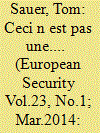

|
|
|
|
|
| Publication |
2014.
|
| Summary/Abstract |
There is hardly anybody in Belgium who publicly defends the continued deployment of US tactical nuclear weapons on Belgian territory. The longer these weapons stay, the more the existing nuclear weapons policy and by extension North Atlantic Treaty Organization itself will be regarded as illegitimate. While one should not expect massive demonstrations similar to that at the beginning of the 1980s, the pressure to protest increases. By describing the different societal and political actors in Belgium and their respective views on the possible withdrawal of US tactical nuclear weapons, this article tries to explain the gap between policymakers and citizens on this issue. The main explanatory variables are a low-profile diplomatic culture and the lack of a strong link between the anti-nuclear movement and the political parties in power, resulting in the absence of political leaders at the governmental level, who clearly speak out in favor of withdrawal.
|
|
|
|
|
|
|
|
|
|
|
|
|
|
|
|
| 2 |
ID:
127826


|
|
|
|
|
| Publication |
2014.
|
| Summary/Abstract |
Transparency, international credibility, democratic accountability, a new realism in defense expenditures - these basic policy goals fit awkwardly with the current deployment of nonstrategic nuclear weapons (NSNW) on Dutch territory. Most parties in the Netherlands want the NSNW removed. Some are even willing to challenge the idea that only consensus among all 28 NATO Allies can lead to the removal of the NSNW. The new Dutch minister of foreign affairs for example, Frans Timmermans, has a long track record of calling for an end to the deployment of US nuclear weapons on Dutch territory. Without NATO consent if necessary. His appointment fits with the political shift that we have seen over the past few years in Dutch politics. This article looks at the political rationale behind that shift: who are the main political actors involved? How have domestic and international pressures influenced party positions? The article also looks at the possibilities a new Dutch Government has were it to challenge the NATO consensus on NSNW. Would the USA refuse to take the NSNW away? How would NATO react and what could mitigate Allied concerns?
|
|
|
|
|
|
|
|
|
|
|
|
|
|
|
|
| 3 |
ID:
127855
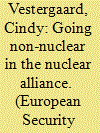

|
|
|
|
|
| Publication |
2014.
|
| Summary/Abstract |
Non nuclear Danish nuclear policy is at a crossroads. Looking back, Denmark's relationship to nuclear technology has been a difficult balancing act for successive governments, trying to soothe an anti-nuclear domestic sentiment on one side and the membership of a nuclear military alliance on the other. This history produced an enduring double approach to nuclear policy by Copenhagen throughout the cold war. Looking ahead, this history is of particular relevance as Denmark and Greenland are considering lifting their twenty-five-year ban on mining radioactive elements and allowing the production of Greenland's uranium. With Greenland's large reserves potentially catapulting this otherwise non-nuclear and non-mining kingdom into one of the world's top suppliers of uranium, the policy debate has to include a look back at Denmark's relationship to nuclear technology, for both peaceful and military purposes.
|
|
|
|
|
|
|
|
|
|
|
|
|
|
|
|
| 4 |
ID:
127823
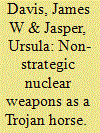

|
|
|
|
|
| Publication |
2014.
|
| Summary/Abstract |
Germany's ambivalent attitude toward nuclear weapons is the result of an intricate rivalry between competing principles and goals of foreign and security policy-making. A deeply engrained strategic culture of anti-nuclearism and anti-militarism competes with a belief in collective defense and alliance cohesion. Similarly, the long-held belief in multilateralism is time and again challenged by newly emerging claims for leadership within multilateral institutions. The strategically rather insignificant non-strategic nuclear weapons issue provides a nodal point around which these conflicting principles came to the fore.
|
|
|
|
|
|
|
|
|
|
|
|
|
|
|
|
| 5 |
ID:
127825
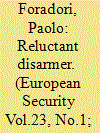

|
|
|
|
|
| Publication |
2014.
|
| Summary/Abstract |
Of the five North Atlantic Treaty Organization (NATO) European countries of US nuclear forward deployment, Italy is the least-known and studied case, even though the country hosts the largest number of US nonstrategic nuclear weapons (NSNWs) and still has two bases of deployment. The paper aims at filling this gap by analyzing Italy's current view on the presence, value, and future of NSNWs hosted on its territory. The analysis begins with the examination of the process of profound devaluation that has minimized, starting from the end of the cold war, Italy's original interest in this category of weapons. It then examines the reasons why Rome continues to pursue conservative nuclear weapon policies and distances itself significantly from the progressive camp of NATO members, particularly Germany, that explicitly call for the withdrawal of US NSNWs from Europe. Through the study of the Italian domestic politics and security culture, the article explains Italy's opposition to any radical change in the NATO nuclear status quo, and its reluctance to pursue policies that are consistent with the process of nuclear devaluation that the country has experienced over the past two decades.
|
|
|
|
|
|
|
|
|
|
|
|
|
|
|
|
| 6 |
ID:
127845


|
|
|
|
|
| Publication |
2014.
|
| Summary/Abstract |
The present article looks at the evolution of Spanish views on deterrence and non-proliferation. Like every member state of the North Atlantic Treaty Organisation (NATO), Spain is covered by the US nuclear umbrella and has accepted the logic of deterrence, while at the same time maintaining a denuclearised status and committing to the goal of disarmament enshrined in the non-proliferation treaty. This article explores the background of Spain's apparently contradictory situation as a denuclearised member of NATO and how it positions itself in regard to the nuclear question in the current security context. It concludes that while Spanish nuclear 'exceptionalism' originally rested on the reluctance of the political elites to alter the precarious compromise that once allowed for Spain's accession to NATO as a denuclearised member, it gradually withered away to give way to a close alignment with Alliance policies driven by a desire to preserve strong security links with its partners.
|
|
|
|
|
|
|
|
|
|
|
|
|
|
|
|
| 7 |
ID:
127821
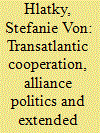

|
|
|
|
|
| Publication |
2014.
|
| Summary/Abstract |
This article discusses the North Atlantic Treaty Organization (NATO) debate regarding American nonstrategic nuclear weapons (NSNW) in Europe, given the broad spectrum of views on nuclear issues when comparing individual member states. What is striking is the gap between public attitudes - which are broadly hostile to keeping NSNW in Europe - and elite opinion, which privileges the maintenance of NATO commitments to preserve alliance cohesion. To better understand this tension, this article dissects the elements of extended nuclear deterrence in Europe, addressing the difficulties associated with current nuclear-sharing arrangements. For some NATO states, the alliance's nuclear weapons are a political liability, since nuclear sharing clashes with international disarmament and nonproliferation commitments. For other NATO members, maintaining the status quo is preferable, as long as there is no alliance-wide consensus on the question of NSNW. These debates have been put to rest, for now, with NATO's Deterrence and Defense Posture Review, which reaffirmed the purpose of the alliance's nuclear weapons. However, these divisive debates point to more fundamental issues in alliance management, namely the credibility of American commitments, the sustainability of extended nuclear deterrence in Europe and the inevitable political tensions these questions provoke at the domestic level for NATO allies.
|
|
|
|
|
|
|
|
|
|
|
|
|
|
|
|
| 8 |
ID:
127838


|
|
|
|
|
| Publication |
2014.
|
| Summary/Abstract |
This article analyses the potential motivations behind the opposition of a number of Central and Eastern European States (CESs) to the withdrawal of US deployed nonstrategic nuclear weapons (NSNWs) from Europe. It shows why CES governments obtain no military benefits from the deployed NSNW; it argues CES are unlikely to truly see them as a promising bargaining chip; it suggests CES can derive only limited prestige from US-deployed weapons and the contrasting norm of 'nuclear disarmament' likely offers a more attractive option; and it assesses potential bureaucratic interests as improbable to play a decisive role. In contrast, the article proposes a more nuanced elaboration of the transatlantic 'linkage' argument. It maintains CES have significant motives to keep the United States involved in Europe, shows how they are likely to mistrust US commitment pledges, and argues they are prone to use the NSNW debate as a convenient instrument (within a limited toolbox) towards locking in the US foothold on the continent.
|
|
|
|
|
|
|
|
|
|
|
|
|
|
|
|
|
|
|
|
|